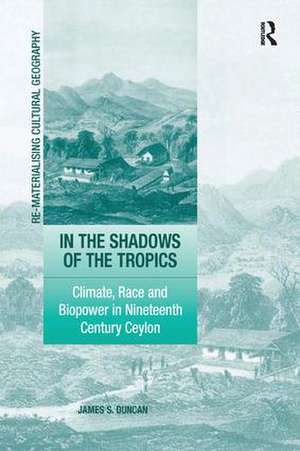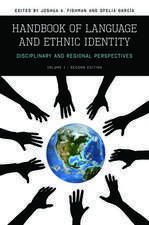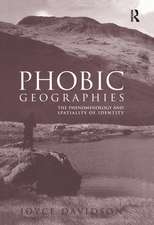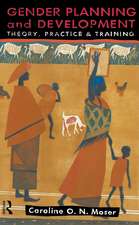In the Shadows of the Tropics: Climate, Race and Biopower in Nineteenth Century Ceylon
Autor James S. Duncanen Limba Engleză Paperback – 15 noi 2016
Toate formatele și edițiile
| Toate formatele și edițiile | Preț | Express |
|---|---|---|
| Paperback (1) | 469.34 lei 43-57 zile | |
| Taylor & Francis – 15 noi 2016 | 469.34 lei 43-57 zile | |
| Hardback (1) | 820.32 lei 43-57 zile | |
| Taylor & Francis – 16 noi 2007 | 820.32 lei 43-57 zile |
Preț: 469.34 lei
Nou
Puncte Express: 704
Preț estimativ în valută:
89.84€ • 97.62$ • 75.51£
89.84€ • 97.62$ • 75.51£
Carte tipărită la comandă
Livrare economică 21 aprilie-05 mai
Preluare comenzi: 021 569.72.76
Specificații
ISBN-13: 9781138262416
ISBN-10: 1138262412
Pagini: 228
Dimensiuni: 156 x 234 x 12 mm
Greutate: 0.45 kg
Ediția:1
Editura: Taylor & Francis
Colecția Routledge
Locul publicării:Oxford, United Kingdom
ISBN-10: 1138262412
Pagini: 228
Dimensiuni: 156 x 234 x 12 mm
Greutate: 0.45 kg
Ediția:1
Editura: Taylor & Francis
Colecția Routledge
Locul publicării:Oxford, United Kingdom
Notă biografică
James S. Duncan is Reader in Cultural Geography, Department of Geography, University of Cambridge, UK, and is Fellow of Emmanuel College, UK.
Recenzii
'Anyone interested in colonialism should read this wide-ranging book, which explores the discourses and tactics of British imperial rule in the tropics. James Duncan’s broad treatment of coffee-growing in Ceylon transforms our understanding of plantation economies in the post-slavery period. In the Shadows of the Tropics blends history, geography, and political economy with cultural and environmental studies, contributing effectively to all these fields.' Lynn Hollen Lees, University of Pennsylvania, USA 'Through an extraordinary exploration of Ceylon’s coffee culture, James Duncan manages to bring before our eyes the tropical world in all its multifarious variety. By throwing a spotlight on the coffee plantation, he is able to disentangle the threads that have gone into the making of that complex geographical entity - ’the tropics’. This book is about coffee; but it is just as much about medicine and morality, bodies and sex, colonial power and worker resistance. In the Shadows of the Tropics is a work of exceptional grace and clarity, whose author manages to triangulate the moral landscape of colonial Ceylon through the everyday experiences of European planters, Tamil labourers and Sinhalese peasants. Altogether a masterly piece of cultural cartography.' David N. Livingstone, Queen’s University Belfast, Northern Ireland '...a welcome and highly significant contribution to the historical literature on Ceylon. It deserves a broad readership.' Architectural History Review
Cuprins
Chapter 1 Introduction; Chapter 2 The Rise of a Plantation Economy; Chapter 3 Dark Thoughts: Reproducing Whiteness in the Tropics; Chapter 4 The Quest to Discipline Estate Labour; Chapter 5 The Medical Gaze and the Spaces of Biopower; Chapter 6 Visualizing Crime in the Coffee Districts; Chapter 7 Landscapes of Despair: The Last Years of Coffee; Chapter 8 Conclusion;
Descriere
In this original work James Duncan explores the transformation of Ceylon during the mid-nineteenth century into one of the most important coffee growing regions of the world. This fascinating case study reveals the spatial fragmentation of modernity through a focus on modern governmentality and biopower, and offers a welcome non-state dimension to current work on studies of governmentality in geography.




















